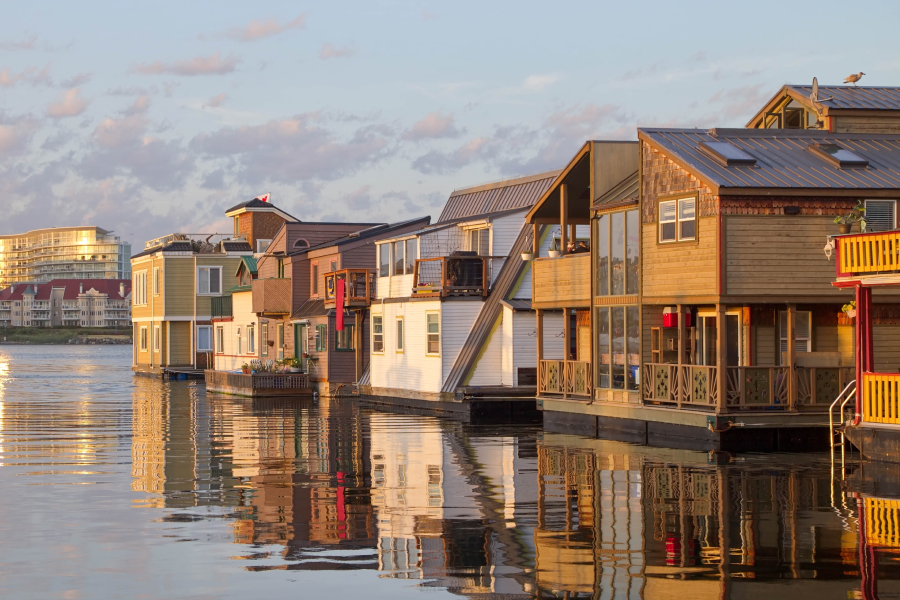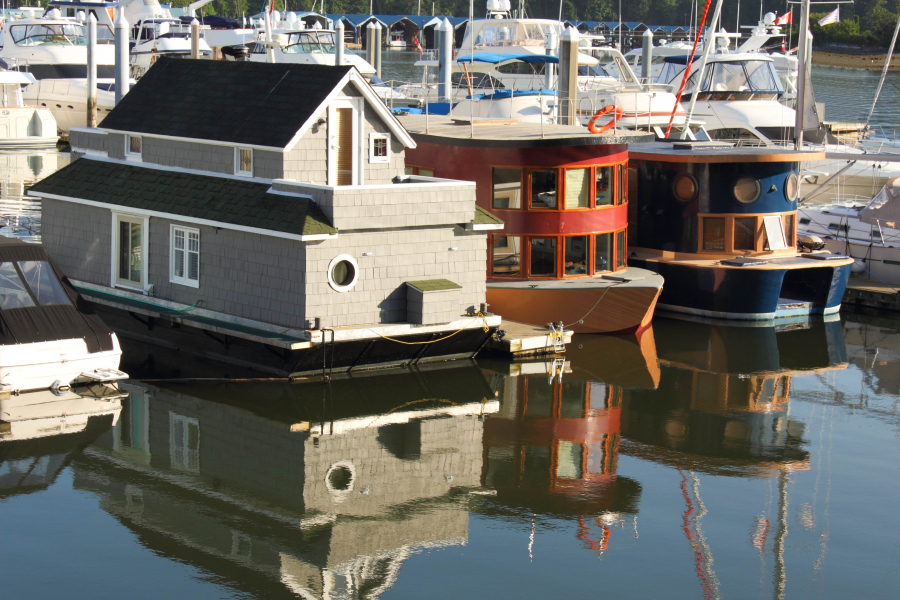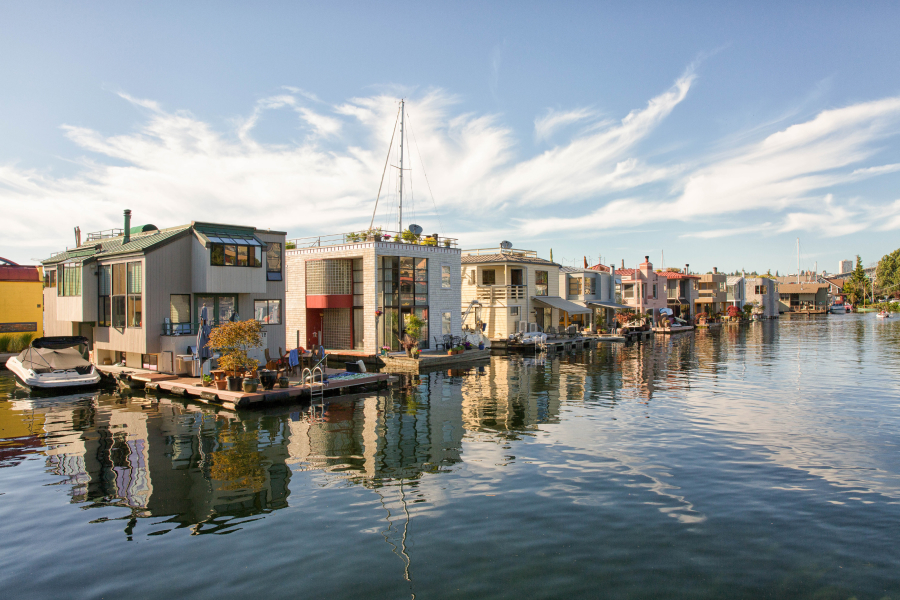Dreaming of living on a houseboat or floating home? Here’s what you need to know about financing, dive inspections, life on the water and more.

If you love being on the water, you may be considering buying a houseboat or a floating home instead of a more traditional residence. Before you venture out into open waters, here’s what you need to know about buying a houseboat or floating home, including the differences between the two, how to approach financing and the pros and cons of owning them.

What’s the difference between a houseboat and a floating home?
The terms “houseboat” and “floating home” are often used interchangeably, but these two types of residences are quite different. A houseboat can either remain in one location or be disconnected from utility services, untied and moved to another place, like an RV. A floating home is typically moved into place and then connected permanently to utility services, like a sticks-and-bricks home on land. Floating homes can range in size from tiny homes to multi-story dwellings.
If you’re unsure whether a particular home is a houseboat or a floating home, ask whether it has a built-in motor. If the answer is yes, it’s probably a houseboat. No, it’s more likely to be a floating home.
In the U.S., you can find houseboats and floating homes in Florida, Massachusetts, Louisiana, South Carolina, Texas, Oregon and Washington State, among many other places. These homes also exist internationally in such countries as Belgium, Canada, France, Germany, Great Britain, the Netherlands and Serbia, among others.
How to buy a houseboat or floating home
Generally speaking, buying a houseboat is more like buying a boat, while buying a floating home is more like a condo on the water.
Floating homes are typically sold by real estate agents with mortgage financing and closing costs that resemble a traditional home transaction and mortgage loan.
Finding houseboats and floating houses for sale or rent may take some digging depending on where in the U.S. you’re searching, but as a start, you can use “houseboat” or “floating home” as a keyword search term on Zillow. A local real estate agent should also be a good resource to find out what’s available in the area where you want to live.
How much does a floating home or houseboat cost?
How much your houseboat or floating home will cost depends primarily on its size, style, location and condition.
While houseboats and floating homes have traditionally been considered and embraced as an alternative to the rising costs of housing in cities like San Francisco, New York and Seattle, they’re not exclusively cheaper than more traditional home types and in some cases, prices for homes on the water have skyrocketed in many locales in line with high demand.
Michele Affronte, a waterfront home expert at Engel & Volkers International Real Estate in Sausalito, California, says the average two-bedroom, two-bathroom floating home in deep water in her area costs about $1.4 million. Larger floating homes may sell for up to $3.2 million. You can typically purchase floating homes with a smaller footprint for about $600,000.
Gunner Davis, a Realtor at Coldwell Banker Realty in Tampa, Florida, says houseboats and floating homes in his area can cost from less than $100,000 to upwards of $1 million. A two-story 50 x 16-foot houseboat would typically sell for about $350,000.
The cost of the boat isn’t the only payment you’ll need to take into consideration; owners of floating homes also typically pay monthly dues to a homeowner association that maintains the dock and slip, while houseboat dwellers will have monthly moorage fees. And just like when you’re buying a traditional home, you’ll want to factor in insurance costs. Regulations vary by state, but you’ll generally want to budget for specialized coverage.

How do you finance a houseboat or floating home purchase?
Finding financing for a floating home can be challenging, says Donald Shurts, a Realtor at Keller Williams Advisors Realty in Beavercreek, Ohio.
“Only a handful of lenders offer any loans for such properties,” Shurts explains. “One reason is that floating home loans cannot be sold to Fannie Mae or Freddie Mac; therefore, property lenders are hesitant to make these loans.”
FHA loans, backed by the Federal Housing Administration, and VA loans, guaranteed by the U.S. Department of Veterans Affairs, aren’t options for floating home financing either.
Shurts’ suggestion for buyers? Ask the seller if they’re able to carry the financing for at least the first few years (preferably five or more) after you buy the home. This means you would be paying the seller, not a lender or bank, mortgage payments toward the cost of the home. You may or may not need to have a down payment, depending on your contract with the seller.
“This could save you tons of cash, as floating home loans [from traditional lenders] require a minimum of 20% of the price as a down payment,” Shurts says.
Houseboats, on the other hand, are considered to be personal property, not real estate. As such, they’re:
- Financed more like RVs than traditional homes.
- Tend to depreciate over time.
- May require payment of state or local sales tax at the time of purchase.
- May require payment of monthly mooring fees. These fees can range from less than $100 to more than $1,000, depending on the location, how large the houseboat is and whether it’s docked at that location during the peak season or the off-season.
Does a houseboat or floating home need an inspection?
A professional home inspection is recommended for any home purchase. When the home is on the water, you’ll need a specialized inspection, which is likely at the very least to include hiring a diver to inspect the hull of a houseboat or the floats beneath a floating home. Keep in mind that lenders may require a float inspection and certificate to finance a floating home.
Like homes built on land, floating homes must meet local building codes. Houseboats may get a little more flexibility for things such as an unusual staircase or unconventional door and window sizes, compared to a floating home.
Can I use a floating home or houseboat as a rental property?
You can generally use floating homes and houseboats as rental properties; however, local rental ordinances are sometimes very restrictive. Prospective buyers should familiarize themselves with these rules before they purchase a floating home or houseboat to generate rental income.
Learn more about purchasing a rental home before a primary residence: Buying an Investment Home First

Pros and cons of living on a houseboat or floating home
You don’t need to be a sailor. Anyone who loves the waterfront lifestyle is a good candidate for living in a houseboat or floating home. “No boating experience is necessary,” Affronte says.
You’ll get your nature fix every day. Floating homes exist within the natural environment and can offer floor-to-ceiling windows and outdoor decks with spectacular views. You’ll likely get plenty of fresh air and natural cooling as well.
Easy access to water sports. With a home literally on the water, you’ll be ready for boating, jet-skiing, swimming, fishing or other water sports whenever the weather permits.
Floating homes really do float. A floating home needs dozens or even hundreds of barrels and floats, made of wood or concrete with a Styrofoam core, to remain on the water.. Maintaining equal weight across the home is crucial to keep it level. An uneven distribution of heavy furniture or people at a party, for instance, could cause a barrel or float to escape from underneath the home.
You really do have to “batten down the hatches.” When a storm passes through or rough water is in the forecast, houseboat and floating home owners need to tie down their patio furniture and put away their cushions and sun umbrellas. It’s no different than being on a ship.
You probably won’t get seasick. Most people don’t suffer from seasickness on the water, but you should spend some time on a boat to make sure you’re not one of the exceptions before you purchase a floating home or a houseboat as a personal residence.
Don’t expect a quick sale. Like other alternative housing types, floating homes and houseboats can take longer to sell than conventional residences. Time on the market is typically a function of price and condition. Well-maintained and attractively priced homes should sell faster.
More resources
Houseboats and floating homes are just two alternative types of housing that might be a good fit for you and your family. Check out these stories to learn about other options:
Do Tiny Homes Appreciate in Value? And 7 Other of Your Tiny Home Questions Answered
What Is a Prefab Home? A Guide to Factory-Built Housing
What Is an ADU? 6 Things to Know Before Building a Backyard Living Space

